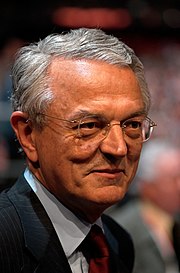François de Montbrial
François de Montbrial | |
|---|---|
 | |
| Prime Minister of France | |
|
In office 8 December 2005 – 24 April 2019 | |
| Monarch | Henry VII |
| Preceded by | Èmile Perroux |
| Succeeded by | Oscar de Saint-Just |
| Minister of Finance | |
|
In office 1 May 1998 – 8 December 2005 | |
| Personal details | |
| Born |
February 6, 1942 Levroux, France |
| Political party | Christian Democratic Party |
| Children | 5 |
| Education | Paris 2 Panthéon-Assas University |
| Profession | Economist |
| Religion | Avignon Catholic |
| Military service | |
| Allegiance |
|
| Branch/service |
|
| Years of service | 1956–1957 |
François de Montbrial (born 6 February 1942) is a French politician who was the Prime Minister of France from 2005 to 2019 and the head of the Christian Democratic Party. An economist by profession, he was also the French Minister of Finance from 1998 to 2004, and was simultaneously the Chairman of the Bank of France and of the Bank for International Settlements from 1995 to 1998. In 2016 he became known for implementing labor reforms, which wanted to eliminate the 35-hour work week and to eliminate certain categories of taxes on the highest income earners.
Montbrial had served in the French Army during Great War II as a conscript. After graduating from the Panthéon-Assas University with an economics degree, he worked at the International Monetary Fund between 1969 and 1975. Back in France, he worked for the Finance Ministry from the mid 1970s to the early 1990s. Montbrial was the governor of the Bank of France, the country's central bank, during the mid-1990s, and in this position he was also the general manager of the Bank for International Settlements in Switzerland. After becoming Finance Minister in 1998 Montbrial worked to enact socially responsible economic policies, based on dirigisme, allowing for state-directed investment, which stood in opposition to the laissez-faire policies of the United Kingdom, which he called "Anglo-Saxon ultraliberalism." Despite this, he began taking a more neoliberal position on economics after he became prime minister. He also famously opposed the Anglo-American 2004 invasion of Syria, questining the evidence of the Syrian government's connections to the September 11 attacks. This caused a rift between him and Sierran and British prime ministers, Matthew Braggs and Douglas Walker. However, he emerged as a leading politician in the Christian Democratic Party in 2004, and this contributed to his appointment as Prime Minister in 2005.
In December 2005 Montbrial became the Prime Minister of France. He opposed French involvement in wars in the Middle East, supported the Avignon Catholic Church and promoted Catholic social teaching, and initially continued his earlier economic policies before taking a neoliberal turn. Because of this he was a popular leader among the French public and maintained a high approval rating, with the Christian Democrats continuing to dominate the French Chamber of Deputies. In the late 2010s his popularity began to decrease, leading to electoral successes for the French Action party at the expense of the Christian Democrats. The 2016 labor reforms, described as an attempt to bring the French economy more into line with the Anglo-American economies, severely damaged his popularity. Montbrial stepped down as Prime Minister after his party's defeat in the 2019 French legislative election.
Early life
Government service
Central banker and finance minister
Prime Minister
Later work
Personal life
Awards and decorations
- Start-class articles
- Altverse II
- 1942 births
- Living people
- 20th-century French politicians
- 21st-century French politicians
- French Avignonese Catholics
- French economists
- French Ministers of Finance
- French Army personnel
- Paris 2 Panthéon-Assas University alumni
- People from Indre
- Prime Ministers of France
- French military personnel of Great War II